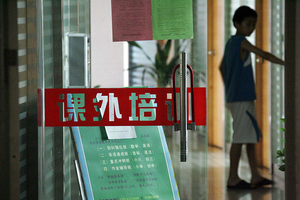Update: China Stocks Retreat in Wake of Regulatory Crackdown

Stocks of Chinese companies continued slumping across a range of market segments amid Beijing’s sweeping regulatory crackdown as investors began fleeing on expectations of more restrictions on private businesses.
The Hang Seng Tech Index, a gauge of many Hong Kong-traded Chinese stocks, plunged as much as 10% Tuesday, while the yuan slid to its weakest since April against the U.S. dollar and investors dumped even Chinese bonds.
Similar sentiments prevailed on Chinese mainland markets. The Shanghai Composite Index fell 2.49%, and the Shenzhen Component Index lost 3.67%.
The dramatic moves underscored how fragile investor confidence has become after Beijing’s months-long regulatory crackdown. Traders say they fear the latest moves against the nation’s education, food delivery and property sectors could expand to other industries such as health care as China tightens its grip on Big Tech and seeks to reduce the wealth gap.
“The spread of declines from the Chinese equities space into the yuan signals that the concerns over regulatory risk in China might have taken a turn for the worse,” said Terence Wu, foreign-exchange strategist at Oversea-Chinese Banking Corp. in Singapore.
Leading investment banks including Goldman Sachs and Bank of America Merrill Lynch issued warnings regarding potential risks for Chinese company stocks traded in the U.S. “Even when you think China risk is priced, … it can get worse,” Goldman Sachs said in a note to clients.
“Although we can’t verify if it’s true or not, the market fears that foreign capital will flow out from the Chinese stock market and bond market on a large scale, so sentiment is badly hurt,” said Li Kunkun, a trader from Guoyuan Securities Co.
Vibrant sectors
Investors in some of China’s most vibrant sectors — from technology to education — have found themselves in the line of fire this month as Beijing attempts to rein in private enterprises it blames for exacerbating inequality, increasing financial risk and challenging the government’s authority.
The online tutoring sector hit by the latest regulatory blow experienced a sharp two-day selloff, wiping out billions in market value for companies traded in the U.S. Some leading players lost 90% of their market value from the peak.
The sharp selloffs reflected investors’ concerns over Chinese regulators’ crackdowns on the tech sector, and some foreign fund managers said they are worried that there will be more restrictions on private businesses, according to Liu Ligang, chief economist of Citibank China.
Some institutional investors including BNP Paribas Asset Management and ARK Innovation in recent months have cut their positions in Chinese stocks.
“Investors are still assessing whether more industries will be affected, but it is too early to say that the government is changing its attitude toward private companies,” said Chen Zhikai, head of the Asian equity business of BNP Paribas Asset Management.
Some analysts said the recent regulatory moves showed authorities’ intention to direct foreign investments to sectors supported by the government and companies traded at home.
Despite the latest clampdown on after-school tutoring companies, Citibank’s Liu said the Chinese education sector is still a promising area for investors as Chinese families’ spending on after-school education is much lower than in most other Asian economies.
Trading in Chinese education stocks listed in the U.S. started to show signs of a reprieve Tuesday morning.
Shares of TAL Education Group and New Oriental Education & Technology Group — down nearly $20 billion in value in the past two trading sessions — each gained as much as 12% in premarket trading. Other companies, including Meten EdtechX Education Group Ltd., Gaotu Techedu Inc. and China Online Education Group were also higher as of 8:15 a.m. in New York.
Bond pessimism
Treasuries climbed with the greenback and the yen as investors sought safe havens. The yield on China’s most actively traded 10-year government notes rose 7 basis points, or 0.07 of a percentage point, to 2.94%, the most in a year. The offshore yuan fell as much as 0.6% to 6.52 per dollar, and one-month volatility in the currency pair posted the biggest jump since May.
The selloff has spread into the offshore Chinese credit market as well. High-yield notes are down as much as five cents on the dollar, while investment-grade bond spreads widened by another 10 to 15 basis points.
“The key concern now is whether regulators will do more and expand the crackdown to other sectors,” said Daniel So, strategist at CMB International Securities Ltd. “The regulatory concerns will be the key overhang to the market for the second half.” So said it was too soon for investors to “bottom fish.”
Technology and education shares retreated again Tuesday while property stocks also fell. Tencent Holdings Ltd. slumped 9%, the most in about a decade, after the company’s music arm gave up exclusive streaming rights and was hit with fines. Its WeChat social media platform stopped taking new users as it undergoes a “security technical upgrade” in accordance with relevant laws and regulations, Tencent said. Meituan fell as much as 18%, its biggest decline ever, as investors digested new rules for online food platforms.
Turnover on Hong Kong’s main equity board reached a record high of HK$361 billion ($46 billion). The Hang Seng Index slid 4.2%, taking its two-day loss to 8.2%, the most since the global financial crisis.
Bloomberg contributed to this report.
Contact reporter Han Wei (weihan@caixin.com), editors Bob Simison (bobsimison@caixin.com) and Michael Bellart (michaelbellart@caixin.com)
Download our app to receive breaking news alerts and read the news on the go.
Get our weekly free Must-Read newsletter.

- PODCAST
- MOST POPULAR






 Sign in with Google
Sign in with Google
 Sign in with Facebook
Sign in with Facebook
 Sign in with 财新
Sign in with 财新